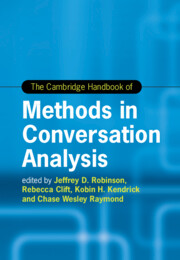Book contents
- Frontmatter
- Contents
- List of Tables
- List of Contributors
- Part I Introduction
- Part II Points of Departure
- Part III Collections
- Part IV Evidence
- 13 Evidencing Conversation-Analytic Claims: How Participants Orient to Social Action
- 14 Evidence for Claims about Interactants’ Sense-Making Processes
- 15 Conversation Analysis as a Comparative Methodology
- 16 The Epistemics of Epistemics: Validating Claims about Epistemic Stance in Conversation Analysis
- 17 Coding and Statistically Associating Inter-Action to Advance Conversation-Analytic Findings
- Part V Avenues into Action
- Part VI Situating and Reporting Findings
- Part VII Looking Forward
- Appendix I Jeffersonian Transcription Conventions
- Appendix II Multimodal Transcription Conventions
- Index
16 - The Epistemics of Epistemics: Validating Claims about Epistemic Stance in Conversation Analysis
from Part IV - Evidence
Published online by Cambridge University Press: 06 December 2024
- Frontmatter
- Contents
- List of Tables
- List of Contributors
- Part I Introduction
- Part II Points of Departure
- Part III Collections
- Part IV Evidence
- 13 Evidencing Conversation-Analytic Claims: How Participants Orient to Social Action
- 14 Evidence for Claims about Interactants’ Sense-Making Processes
- 15 Conversation Analysis as a Comparative Methodology
- 16 The Epistemics of Epistemics: Validating Claims about Epistemic Stance in Conversation Analysis
- 17 Coding and Statistically Associating Inter-Action to Advance Conversation-Analytic Findings
- Part V Avenues into Action
- Part VI Situating and Reporting Findings
- Part VII Looking Forward
- Appendix I Jeffersonian Transcription Conventions
- Appendix II Multimodal Transcription Conventions
- Index
Summary
The study of epistemic issues in conversation focuses on the knowledge claims that interactants assert, contest, and defend in turns at talk and sequences of interaction. Epistemic issues permeate all the topics that conversation analysts study and are central to ‘recipient design’ – the ways in which speakers design their talk to accommodate the specifics of the context and the particular others who are their interlocutors. However, the study of epistemics is complicated by the fact that CA methodology permits the attribution of subjective knowledge to participants as a part of the analytic process only if the attribution is grounded in the data of interaction. While this stipulation has tended to inhibit research on epistemics in the past, the development of the notion of epistemic stance has enabled researchers to focus on how persons present themselves as more or less knowledgeable, and have those claims upheld or contested by others. This chapter identifies and illustrates seven sources of evidence that can be used, separately and in combination, to ground analytical claims about epistemic stance and status in conversational interaction. The analysis of epistemics is shown to have deep continuities with general conversation analytic procedures used across the field.
- Type
- Chapter
- Information
- The Cambridge Handbook of Methods in Conversation Analysis , pp. 419 - 451Publisher: Cambridge University PressPrint publication year: 2024

